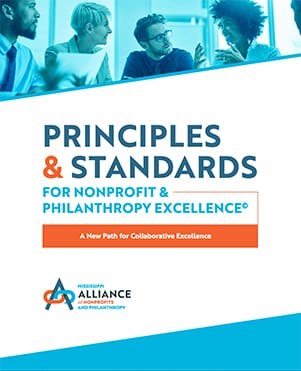Principles & Standards
For Nonprofit & Philanthropy Excellence
The 12 Accountability Principles
4. Fundraising
About
Policies & Practices
1. The board of directors of nonprofit & philanthropic organizations have a responsibility to adopt a fund development plan and systems to ensure that sufficient charitable contributions are raised to meet budgeted objectives. All types of fundraising should be considered including planned giving, capital campaigns, annual appeals, and more. When appropriate, endowment and reserve funds should be established to advance the organization’s mission.
2. The fund development plan should be incorporated into the strategic plan and operational plan of the organization.
3. Nonprofits and philanthropies should have a policy that sets out conditions under which it would decline funds or in-kind donations given for purposes outside the scope of its mission or that would otherwise bring about adverse conditions for the organization or its constituents.
4. Nonprofits and philanthropies should ensure that a high percentage of each dollar raised goes directly to funding its programs and services. These percentages should be in accordance with practices of comparable organizations and with representations made by the organization to contributors and the public.
5. To avoid “mission drift,” nonprofits and philanthropies should raise funds for programs related to its mission and not develop programs simply to meet funder’s guidelines or seek non-mission related funds. FS
6. Compensation for fundraising personnel and contractors should not be based on a percentage of funds raised or other commission-based formulas. IRS
7. Nonprofits and philanthropies should ensure that any outside individual or organization that solicits funds on its behalf meets the Mississippi Secretary of State’s registration requirements and all other regulations governing the activities of professional fundraisers. Fundraisers should be closely monitored to ensure they follow accountable fundraising practices, make required disclosures, and work as responsible stewards of the organization’s goodwill. FS MS
8. The board and executive director should be familiar with the Association of Fundraising Professionals’ Code of Ethical Principles and Standards of Professional Conduct. (http://www.afpnet.org).
9. The board of directors should assume overall responsibility for raising sufficient funds to meet the organization’s budgeted objectives. FS
Accountability to Donors
10. Nonprofits and philanthropies must comply with all federal, state, and local laws concerning fundraising practices. FS MS
IRS
11. Organizations are responsible for conducting their fundraising activities in a manner that upholds the public’s trust in stewardship of contributed funds. FS
12. Nonprofits and philanthropies must use funds consistent with donor intent and comply with specific conditions placed upon donations. Endowed or permanently restricted funds must be used for the purpose(s) the donor intended. FS IRS
13. Nonprofits and philanthropies should work toward achieving a balance between publicly recognizing charitable contributions and maintaining donor confidentiality when needed. Nonprofits and philanthropies must not trade, share, or sell donor names with others unless given permission by the donor.
14. Nonprofits and philanthropies should respect donor preferences in the handling of their information and should implement systems and policies that secure this information, effectively use it to communicate with donors and prevent its use for improper purposes. Organizations are allowed to share but they must not trade or sell contact information for any donor without prior permission from the donor.
Communications with Donors
15. Fundraising communications, including fundraising appeals, must include clear, accurate, honest information about the organization, its activities, and when, where and for whom the funds will be used in addition to the tax treatment of a contribution. FS IRS
16. When developing a fundraising campaign, charitable organizations should honor donor preferences regarding how often donors are contacted and how they receive that communication.
17. Charitable organizations must send a written acknowledgment to all donors who make a “quid pro quo” donation (that is, a payment made partly as a contribution and partly for goods and/or services) in excess of $75 and must also send a written acknowledgment to all donors who made contributions of $250 or more in cash or property in the previous calendar year. For donors who have not given more than $250 in the previous calendar year, nonprofits should send an annual statement of giving. FS IRS
18. Nonprofits and philanthropies should regularly communicate with donors regarding activities and should make such information available through multiple outlets (Websites, emails, newsletters, press releases, and advertising). FS

